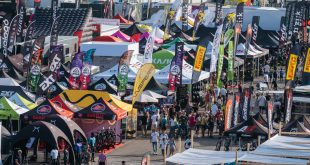From 1st Jan, road bike makers have to pay $14,405 per aero frame for ‘Approved by UCI’ stickers.
"Tubular" frame bicycles – as defined by the UCI – will be simpler to certify, so the approvals procedure costs less.
At Eurobike in September 2010, the UCI announced it was "making peace" with the bike industry by streamlining the process for okaying compliant road bike dimensions. A new expert body would pre-approve frames and aero equipment. This, it was said, would remove the worries of go-faster equipment being rejected on race start lines.
In January 2009, the UCI started to enforce its Lugano Charter more rigidly. This UCI equipment dictat was created in 1996 with no input from the bicycle industry.
The Charter, and spin-off technical regulations, have always been open to misinterpretation. Famously, thanks to UCI commissaire decisions, products have had to be stripped from bikes soon before the start of races such as the Tour of California and the Tour de France. UCI commissaires at previous races have allowed the same equipment.
The ‘3:1 aero equipment rule’ – since 2009 applied to frame tubes as well as accessories such as handlebars – has long been a bone of contention with teams and equipment sponsors.
However, now that more details have been gleaned regarding the new ‘Approved by UCI’ protocol, which came into force on 1st January, bike manufacturers have criticised the protocol as little more than an expensive sticking program.
To be approved by the UCI, frames and forks (and later other components and even clothing) have to be sent to the UCI’s approval lab at the cost of $14,405 per frame. The initial contact is via secure email: manufacturers have to submit tech drawings and then later have to supply the actual frames, including for every size of frame.
In theory, this would prevent manufacturers going to the expense of making prototypes or finished frames that were later deemed illegal by the UCI.
However, the labelling program introduces costs that were not there before. This raises the prospect of price increases for high-end bikes as many manufacturers, especially smaller ones, will have to pass on the UCI costs to consumers.
Bike companies will be meeting with the UCI at a conflab in Switzerland, 13-14th January. This ‘Approved by UCI’ meeting will be co-hosted by the World Federation of the Sporting Goods Industry (both the UCI and WFSGI are based in Switzerland).
The first products to be covered by the ‘Approved by UCI’ labelling program are frames and forks (road, track, cyclo-cross but not yet BMX or MTB) in development from 1st November 2010.
Accreditation for 2009/2010 frames is possible but not an obligation, said the UCI. The accreditation process starts with frames and forks. Wheels, saddles, handlebars and even clothing will be brought into the scheme later.
The approvals process will not be carried by the UCI but by the Ecole Polytechnique Fédéral de Lausanne (EPFL). The UCI stresses that manufacturers need not be worried their technical drawings will be leaked to third parties as the PDF sending to the UCI will be done in a secure way.
Once EPFL has passed the tech drawings as compliant, manufacturers have to ship prototypes or mass-produced frames. These are then mapped against the drawings with an extremely precise computerised three-dimensional measuring machine. This machine could also be deployed at UCI races to check that stickered bikes are what they are purporting to be.
The new protocol will enforce existing rules, such as the controversial rule that states "Bicycles and their accessories shall be of a type that is sold for use by anyone practising cycling as a sport. The use of equipment designed especially for the attainment of a particular performance (record or other) shall be not authorised.”
The UCI said the approval procedure is "intended to improve and simplify various aspects of competitive cycling."
According to the UCI, the benefits of the new approvals program include:
"Manufacturers are informed about the regulations in force before starting a production run of parts.
"The approval protocol offers an optimised approach and service to allow new equipment to be brought to market as quickly as possible.
"The labelling of frames and forks brings added value to the newly approved equipment.
"The approval offers reassurance to riders and future customers that the model complies with the regulations in force.
"The approval allows the manufacturer to avoid having his equipment rejected at the start of an event. Arguments about the compliance of new equipment are avoided."
It’s important to stress that EPFL will not be testing bikes for safety, it will only be measuring dimensions.
The UCI said "[we] not be liable for any consequences deriving from the choice of the equipment used by licence holders, nor for any defects it may have or its non-compliance. Equipment used must meet applicable official quality and safety standards."
The ‘Approved by UCI’ sticker program is therefore on top of existing safety standard testing, including CEN standards in the European Union.
It could take the EPFL up to three months to approve drawings and sample products, said the UCI.
"Before the Application Form is submitted, the UCI encourages manufacturers to let them know about their ideas and concepts, in order to avoid any clear breaches of the regulations, to allow a model that complies with the requirements to be designed without delay and to avoid unexpected issues when the technical drawings are checked."
Only ‘one piece’ frames – which require a mould during manufacturing – are subject to the full UCI approval procedure. All other models, assembled by welding, brazing, gluing or other techniques, will go through a "simplified approval procedure" costing about $800 per frame.
"This procedure includes solely the submission of the Application Form, the check of dimensions from a drawing and labelling," said the UCI.
Frames or forks from a single manufacturer that are of a perfectly identical shape which differ only in name constitute a single model for the purposes of the protocol, said the UCI.
"Following the acceptance of technical drawings by the UCI, the manufacturer is free to produce either a single copy of its new model at actual size, or to start mass production of its new model. If the manufacturer chooses to move directly to the production stage, it shall bear all risks relating to a rejection if the production model fails to conform to the approved technical drawings. The manufacturer sends the UCI one example of each size, corresponding to the measurements previously accepted, for approval. The manufacturer is responsible for the costs of shipping."
And it will be important for manufacturers to have a steady hand when applying the $14,405 labels: "If the label is applied incorrectly…the frame does not comply."
The label must be visible, indelible and inseparable from the frame. The manufacturer has to apply the label at the same time as branding decals are applied. The location of the label on the frame has to be approved by the UCI before it is applied to the frame.
Only the original manufacturer is permitted to "re-enamel" frames and reapply the label. This will make it extremely expensive, perhaps prohibitively so, for resprays or cosmetic remodelling for promotional purposes.
And don’t think about printing off your own roll of $14,405 labels: "any misuse of the label or use contrary to the provisions…may be penalised by a fine of between CHF10,000 and 100,000," said the UCI.
A Swiss Franc is worth about a dollar so the fine for counterfeit labelling would be up to $100,000.
"The approval procedure for frames and forks is a service that the UCI has set up for manufacturers, but also for licensed riders, teams, commissaries and the sport of cycling in general," said the UCI.
"To ensure that the approval procedure is effective and perfectly equitable, qualified personnel and specialised equipment are required. Therefore, the implementation and proper operation of this service incurs costs that the UCI cannot bear alone. The amounts requested of manufacturers for this service are reduced to a minimum…"
In a December 23rd BikeBiz.com story on the stickers, a spokesperson from the WFSGI said the approvals stickers would cost about $10,400.
According to the UCI, "The manufacturer shall pay the UCI a contribution for the costs incurred for the administrative procedures, examinations of documentation and checks of models in accordance with the following rates: CHF12,000+VAT for each model of frame and forks submitted by the manufacturer for the full procedure for a maximum of 8 sizes. CHF1,400+VAT for minor changes to one size or the addition of one size of apreviously approved model of frame and forks, in case of full procedure. CHF800+VAT for each model of frame and forks submitted by the manufacturer for the simplified procedure for a maximum of 8 sizes.
"The sum due shall be paid into the UCI bank account by the manufacturer within 30 days of invoicing for each submission of a new model."
The UCI’s protocol was discussed at length on today’s episode of The Spokesmen Roundtable podcast, available to listen online or on iTunes.
============
This move by the UCI could muscle out smaller suppliers, and will definitely dent trade for custom builders and respray businesses. What do you think? There will soon be a follow-up article on BikeBiz.com with comments from manufacturers and other interested parties. If you wish to air your views, do so in the comments section or email me directly, carlton.reid@intentmedia.co.uk
 BikeBiz Bicycle and cycling retail news
BikeBiz Bicycle and cycling retail news



